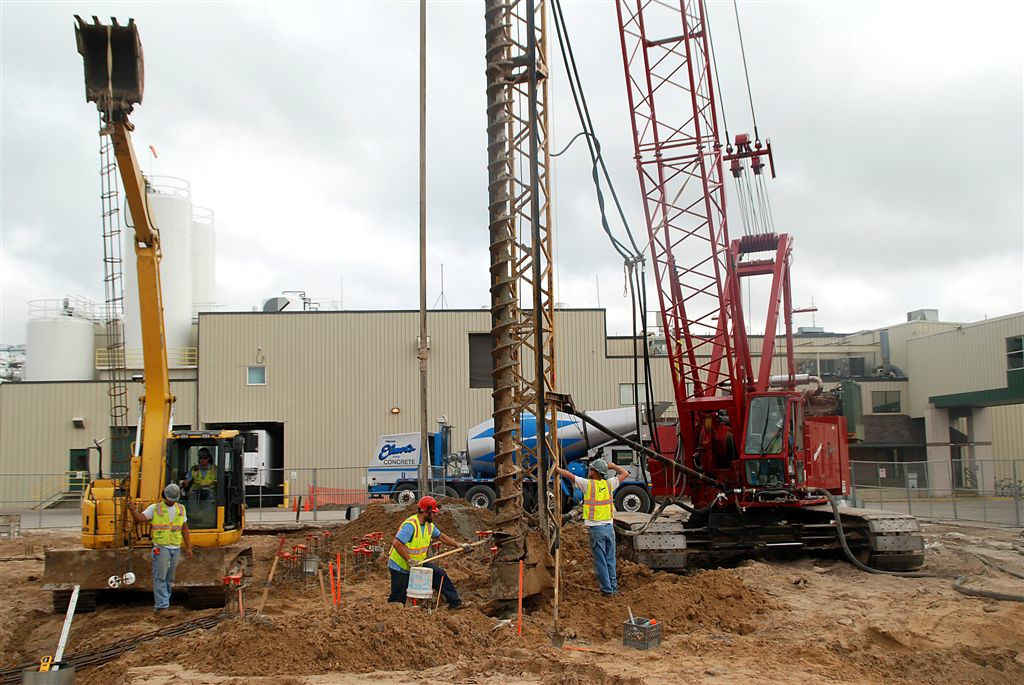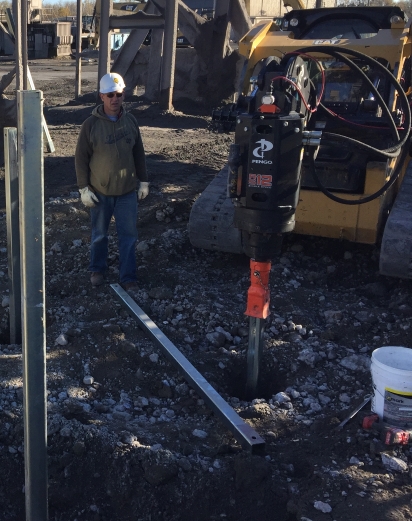Helical Piles compared to Auger Cast in Place piles (ACIP)
Synonyms: Auger Pile; Auger Cast Pile; CFA Pile; Continuous Flight Auger Pile; Auger Pile; Auger Grouted Pile; Auger Grouted Cast in Place Pile
Economics:
Auger Cast in Place Piles – ACIPs: The old construction adage “Concrete is cheap” is the cost advantage ACIPs bring to the table. The bulk of their construction materials is cementaous grout. So for very large jobs, low material costs will off set the high mobilization, equipment and crew costs.
Helical Piles: The cost advantage for helical piles is low equipment and crew requirements. Mobilization costs are much lower than for ACIPs. Helical pile material is steel. So helical material cost per foot of depth is higher than for ACIPs. Helical piles install much faster than ACIPs, so helical labor and equipment cost per pile will always be less.
When will Helical Piles have the advantage? For pile counts of 200 piles or less helical piles should be cheaper than ACIPs. (Possibly even for higher pile counts, we need the opportunity to demonstrate it.) For pile counts less than 15-30, helical piles could very possibly be cheaper than the ACIP mobilization cost. Consider the total installed cost when evaluating an ACIP proposal. Have you included the rebar cage fabrication and installation cost; spoils handling and disposal costs; site access prep cost; and post installation costs such as can removal and excess grout removal.
Equipment Requirements:
Auger Cast in Place Piles – ACIP: To install ACIPs the following equipment would typically be needed:
- Crane with auger to drill the holes
- Concrete pumper unit with hoses to pump the grout
- Picker to handle and install rebar and rebar cages
- Payloader or skid steer and dump trucks to handle augered out spoils
- 3rd Party concrete trucks to delivery the grout.

Helical Piles: To install helical piles can require as little as a skid steer with forks and drive head. Larger piles may require an excavator with drive head, fork truck, and picker. Crew and equipment requirements for helical piles will always be much less than ACIPs.

Helical piles are often the superior alternative to auger cast in place (ACIP) piles. Situations where helicals are the better choice instead of ACIP Piles:
Schedule – Advantage helical piles
Depending on depth, up to 40 helical piles per day per crew can be installed. Where access is less than good helical piles are less affected than any other type and the time to install will still be substantially less
Tight access and low clearances – Advantage helical piles
If a skid steer or mini-excavator can reach the site a helical pile can be installed. ACIP equipment requires substantial clearance in all directions, plus accessibility for grout trucks and spoils removal equipment.
Install in any weather & site conditions – Advantage helical piles
If a skid steer can reach the pile location a helical pile can be installed. Frozen ground is not an issue. Rain, sleet, and snow may make it miserable but does not stop the installation process. High water tables and standing water do not prevent helical piles from being installed.
Immediately Usable – Advantage helical piles
Helical piles are immediately load bearing. Other construction activities can begin as soon as the piles are installed. ACIPs require cure time and prep work before other activities can begin.
Piles removable and reusable
Helical piles can be removed and re-installed. For temporary installations only helical piles can be completely removed when the site is cleared.
Service: Helical piles; helical piers; steel piles; deep foundations;
Areas served: Arkansas, Louisiana, Mississippi, Tennessee, east Texas, Missouri, Oklahoma
Advantages: Quick service; low mobilization cost; Tight access; Low Clearance
key words: helical pile; helical piles; Arkansas
Helicals where ACIPs are not Recommended:
- Contaminated Soil: If soil needs to be left in place for any reason then augering is not a viable option. Helical piles did not generate spoils and can be installed through the contaminated soil. An evaluation should be done to consider if the contamination will corrode the steel pile.
- Existing Structures on granular soil: Caution should be used if considering ACIPs near an existing structure built on granular soil. The auger process can potentially undermine the existing foundation. Helical piles install through the soil and do not undermine surrounding structures.
Common Problem Areas:
- Layers of Rock: Thin layers of rock can be a problem for both ACIPs and helical piles. Helical piles will not penetrate through layers of rock or large cobble. If the layers are not thick enough to support the load then the pile will not have the required load bearing capacity. ACIPs similarly may have issues getting through the rock and will not have the required load bearing capacity.
- Weak Soil: For different reasons soils with SPT values less than 3 or 4 can be a problem for helicals and ACIPs. For helical piles the zones with soft soils need to be evaluated for buckling potential. For ACIPs these zones may allow the grout to travel to areas where it is not desired.